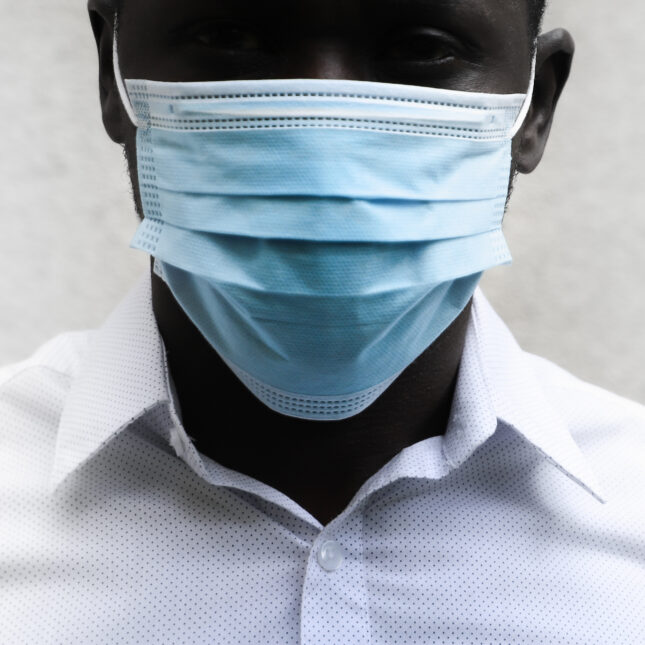
The Covid-19 pandemic is putting me in a difficult position as a physician and as a Black man. The order to wear a face mask in public has made it worse.
I’m a psychiatry resident at a safety-net hospital just outside of Boston. In the last week of March, I and health care workers from other specialties were redeployed to work in the hospital’s general medicine units to provide care for the surge of patients infected with Covid-19 as well as those with other medical problems.
All of us — nurses, physicians, and other health care professionals — had to work through obstacles as we rapidly learned new skills. We’ve bonded over this intense experience, sharing concerns about increased exposure to the virus that causes Covid-19, the families and friends we put at risk from our work, and what we are doing to stay healthy.
I share many of the fears and anxieties of my hospital co-workers surrounding Covid-19. Yet there are some ways the pandemic affects me in ways my colleagues have trouble understanding.
Take the simple act of wearing a face mask when out in public.
Long before Covid-19 existed, I’ve had to plan my wardrobe carefully. Standing 6 feet, 3 inches tall, I’ve become something of an expert at reading microexpressions of discomfort as I walk down a street and see the white person walking toward me trying to decide whether to cross to the other side, especially in the evening.
With the emergence of Covid-19, I’ve spent time weighing the pros and cons of wearing a face mask on evening walks to pick up takeout food or to go to the grocery store. I often opted not to wear one so I wouldn’t be perceived as appearing “suspicious.” My decision-making went as far as limiting how often I went out after dark, knowing that some people will see a masked Black man as a threat.
Then I received a text alert from my city one morning telling me that using a face mask is now mandatory in public and that people who don’t comply with the order could face a $300 fine.
As a physician, I favor things that will help reduce the transmission of coronavirus infections. But as a Black man, I wondered how this order will affect people who look like me. I wondered if this order went into effect with any understanding of the fear and anxiety it could inflict on people of color.
That might sound irrational to some. But it resonates with many Black people, who are far too familiar with having to interact with law enforcement for appearing “suspicious” and in many instances having to fear for their life during these interactions. When I walk in my neighborhood, I sometimes can’t help but think of Henry Louis Gates, the Black Harvard scholar who was arrested as he tried to get into his own house in Cambridge. I wonder whether someone would call the police on me, a “suspicious” Black man in a face mask. I negotiate with myself whether risking my life is worth a $300 fine. The recent murder of Ahmaud Arbery, who was shot while jogging through a neighborhood outside Brunswick, Ga., serves as another reminder for me that, as a Black person, enjoying simple activities such as jogging outside requires preparing for the possibility of losing my life.
Many of my colleagues have the privilege of not thinking about this when they recommend that I go for “a walk around the neighborhood” as a wellness activity during this pandemic.
As a nation we are witnessing the traumatic effects Covid-19 is having on patients, their families, and health care workers. As a resident physician, like other health care workers I shoulder the burden of working longer hours, increased exposure to sickness and death, and isolation from family and friends.
As a psychiatrist, I will almost certainly have to relive these traumas as I see and counsel patients, some of whom will be health care workers, in the pandemic’s aftermath. I expect this need will be greater in Black and Latinx communities, in which racism has created great health disparities and accounts for a disproportionate number of deaths related to Covid-19. As I balance growing my medical knowledge while caring for patients struck by a pandemic that has, as I write this, already taken the lives of more than 80,000 people in the United States alone, I am also managing the microaggressions and psychological assaults that come with being a Black person in this country.
Covid-19 serves as another reminder of how deeply rooted structural racism is in our society and how a title — or a mask — can do little to protect me from it. This doesn’t mean I won’t wear a mask when I’m out in public. I will do my part to limit the spread of Covid-19. The mask order isn’t the issue here. Racism is.
My mask worries simply serve as another example of how Black people experience the world differently due to systemic racism. It is my quiet hope that even during this frightening and uncertain time we can recognize that racism and prejudice are not put on hold during a global pandemic, and do something about it.
Gabriel Felix is a psychiatry resident at Cambridge Health Alliance in Cambridge, Mass.
To submit a correction request, please visit our Contact Us page.












